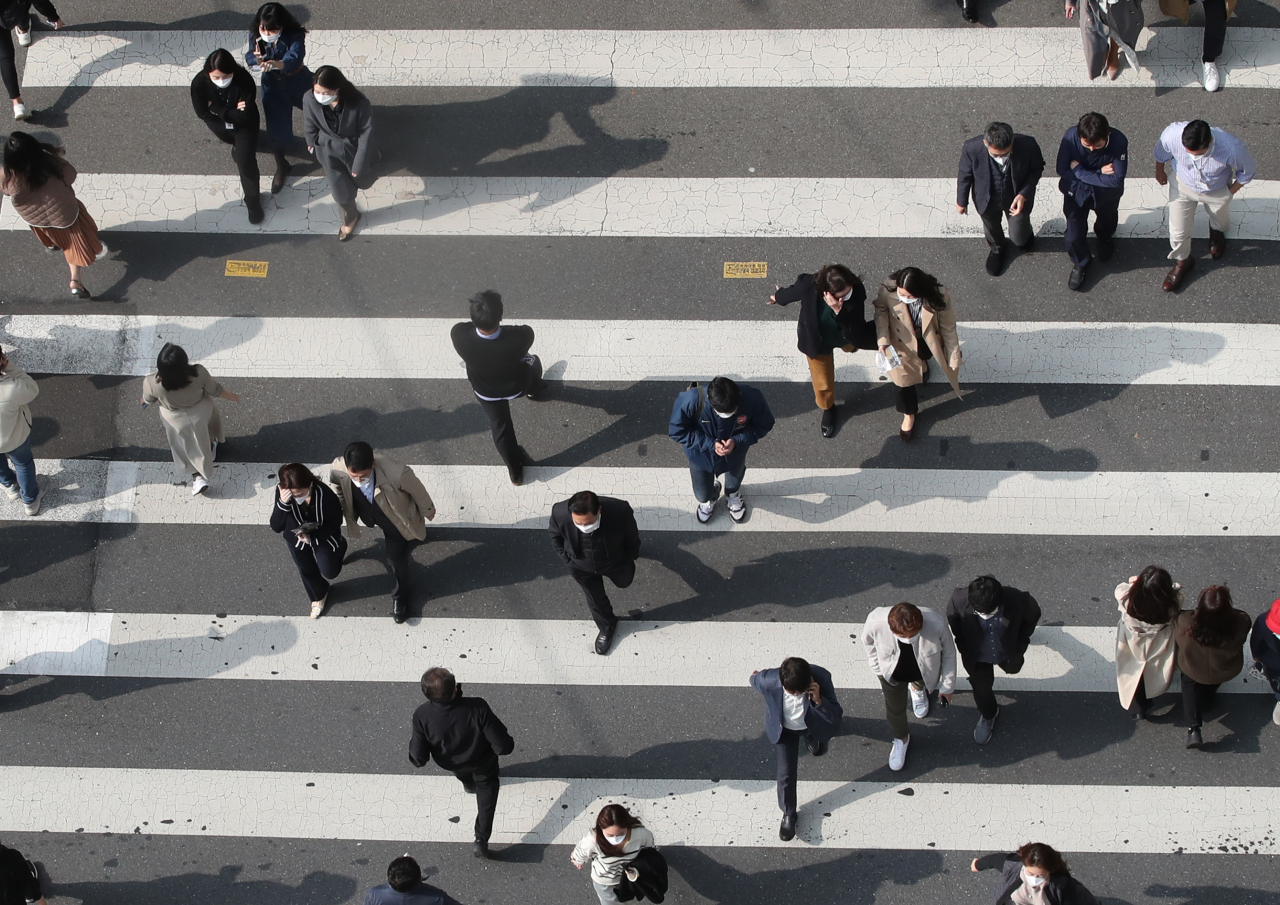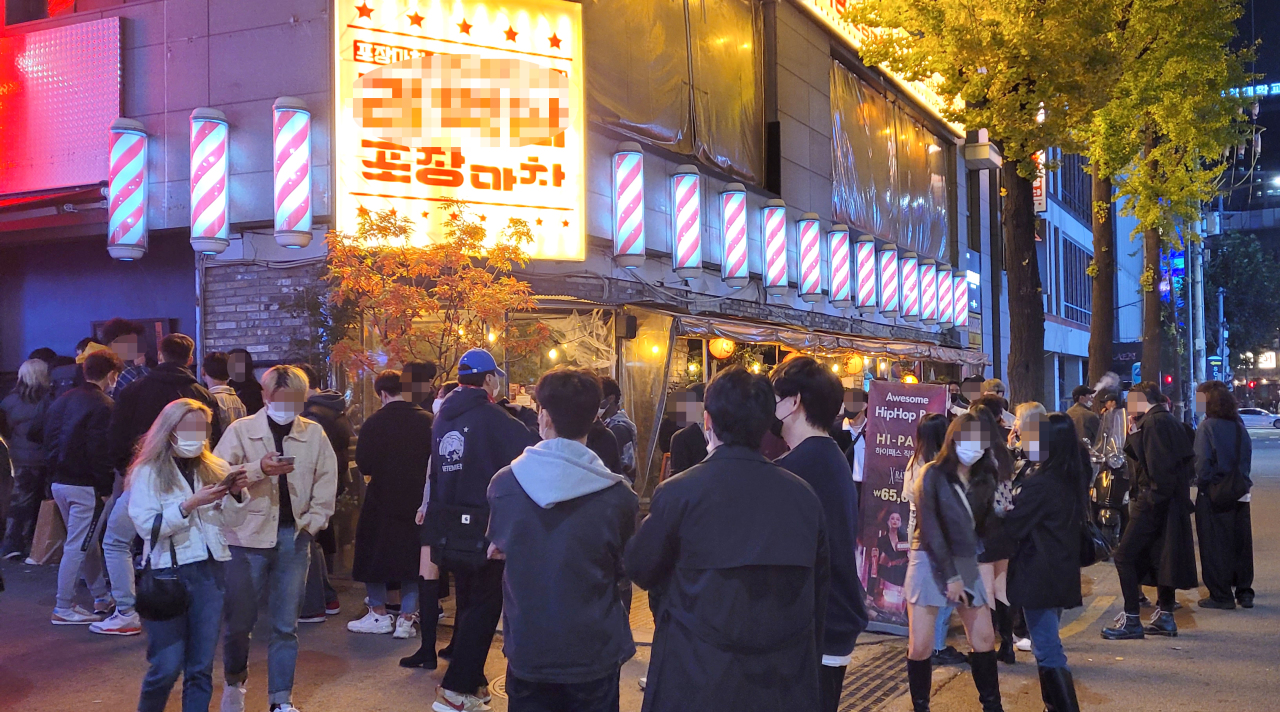[Feature] ‘Hoesik is back’: After-work dinners return as restaurant curfews end
Workers and restaurant owners have mixed reactions to return of drinking get-togethers
By Yim Hyun-suPublished : Nov. 2, 2021 - 15:50

As South Korea shifts gear toward “living with COVID-19,” after-work dinners, or hoesik, are among the first things to return.
After a nearly 1 1/2-year hiatus, the return of office dinners, which often involve binge drinking and are met with mixed reactions from workers, have been welcomed by the hospitality industry and small-business owners hit hard by the pandemic.
At Korean barbeque restaurant Blue Roof Town in Seoul’s Mapo district, one of the more popular areas for after-work get-togethers, there has been an increase in bookings following the government’s decision to allow gatherings of 10 people in Seoul and the surrounding areas.
“People knew about the easing of restrictions starting Nov. 1 so bookings for hoesik (in November) were already made in the week running up to this month. Bookings for groups of six, seven or eight are something we haven’t seen until recently,” said the restaurant’s manager surnamed Song.
“We already have group bookings until next Thursday and Friday,” the manager added.
Alcohol companies are also welcoming the shift in mood. Oriental Brewery launched an in-person marketing event last month for its flagship beer, Cass, while liquor maker HiteJinro said some restaurants have ordered “more supplies than usual” in hopes of an increase in revenue.
Chae, an employee who supervises a team at a Japanese electronics company, said he is delighted to bring the culture back, as he anticipates team dinners to increase communication within his team that went missing for the past two years.
“After a year and a half with no hoesik, I really felt the need to bring it back. Hoesik is not just useless hours of heavy drinking but a way to enable communication and strengthen team work. Also I didn’t have a chance to get to know people who were newly hired this year,” said Chae, who is in his 40s.
Sagong Byung-yong, a 30-year-old who works at an accounting firm in Yongsan district, said he scheduled a hoesik in Hannam-dong, central Seoul, immediately after the government announced an easing of COVID-19 protocols.
“At the accounting firm I work at, I am seeing a growing number of people trying to push for a small-sized hoesik of six to eight people,” he said.
The reaction toward this change in atmosphere in the office however seems to be mixed across generations. While senior workers felt delighted to bring it back, some young people were less enthusiastic.
“I really liked being able to spend the evening hours (since the pandemic) all to myself, working out and going to CrossFit classes. I am worried that hoesik might get in the way of this healthy routine I‘ve got going recently,” said Ji Yeong-gyu, 34, who works at a Samsung subsidiary.
After a nearly 1 1/2-year hiatus, the return of office dinners, which often involve binge drinking and are met with mixed reactions from workers, have been welcomed by the hospitality industry and small-business owners hit hard by the pandemic.
At Korean barbeque restaurant Blue Roof Town in Seoul’s Mapo district, one of the more popular areas for after-work get-togethers, there has been an increase in bookings following the government’s decision to allow gatherings of 10 people in Seoul and the surrounding areas.
“People knew about the easing of restrictions starting Nov. 1 so bookings for hoesik (in November) were already made in the week running up to this month. Bookings for groups of six, seven or eight are something we haven’t seen until recently,” said the restaurant’s manager surnamed Song.
“We already have group bookings until next Thursday and Friday,” the manager added.
Alcohol companies are also welcoming the shift in mood. Oriental Brewery launched an in-person marketing event last month for its flagship beer, Cass, while liquor maker HiteJinro said some restaurants have ordered “more supplies than usual” in hopes of an increase in revenue.
Chae, an employee who supervises a team at a Japanese electronics company, said he is delighted to bring the culture back, as he anticipates team dinners to increase communication within his team that went missing for the past two years.
“After a year and a half with no hoesik, I really felt the need to bring it back. Hoesik is not just useless hours of heavy drinking but a way to enable communication and strengthen team work. Also I didn’t have a chance to get to know people who were newly hired this year,” said Chae, who is in his 40s.
Sagong Byung-yong, a 30-year-old who works at an accounting firm in Yongsan district, said he scheduled a hoesik in Hannam-dong, central Seoul, immediately after the government announced an easing of COVID-19 protocols.
“At the accounting firm I work at, I am seeing a growing number of people trying to push for a small-sized hoesik of six to eight people,” he said.
The reaction toward this change in atmosphere in the office however seems to be mixed across generations. While senior workers felt delighted to bring it back, some young people were less enthusiastic.
“I really liked being able to spend the evening hours (since the pandemic) all to myself, working out and going to CrossFit classes. I am worried that hoesik might get in the way of this healthy routine I‘ve got going recently,” said Ji Yeong-gyu, 34, who works at a Samsung subsidiary.

While the pandemic could change how companies do hoesik, Lim, a 33-year-old office worker believes the culture itself will never go away.
“I expect unhygienic practices people did during hoesik, like sharing the same glass, etc. will disappear in the ‘living with COVID’ phase, but hoesik is part of the Korean office life and that will not go away,” Lim said.
Though reaction was mixed among workers, professor Ahn Dong-hyun at the department of economics at Seoul National University said efforts of hard-hit small-business owners in the service sectors, including food and beverage, accommodation and tourism, should be recognized.
“In a way, much of the success of K-Quarantine is thanks to the sacrifices of those such as small business owners. They deserve to receive sufficient support (from the government),” he said.
As the government is set to move forward with further steps to reopen the economy, Ahn said the situation surrounding the COVID-19 pandemic has changed.
“At the beginning, prevention was of utmost importance. But with death rates now dropping, aspects such as the economy and a return to normal life cannot be overlooked and more weight should be attached to them (in dealing with the pandemic),” the professor said.
By Yim Hyun-su & Kang Jae-eun (hyunsu@heraldcorp.com) (kang.jaeeun@heraldcorp.com)








![[Kim Seong-kon] Democracy and the future of South Korea](http://res.heraldm.com/phpwas/restmb_idxmake.php?idx=644&simg=/content/image/2024/04/16/20240416050802_0.jpg&u=)







![[KH Explains] Hyundai's full hybrid edge to pay off amid slow transition to pure EVs](http://res.heraldm.com/phpwas/restmb_idxmake.php?idx=652&simg=/content/image/2024/04/18/20240418050645_0.jpg&u=20240418181020)

![[Today’s K-pop] Zico drops snippet of collaboration with Jennie](http://res.heraldm.com/phpwas/restmb_idxmake.php?idx=642&simg=/content/image/2024/04/18/20240418050702_0.jpg&u=)